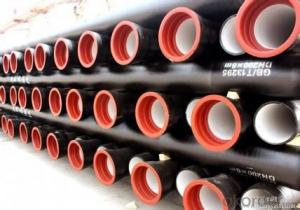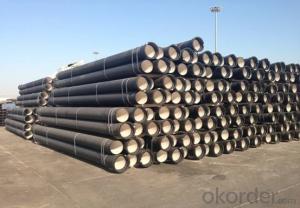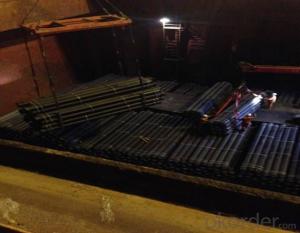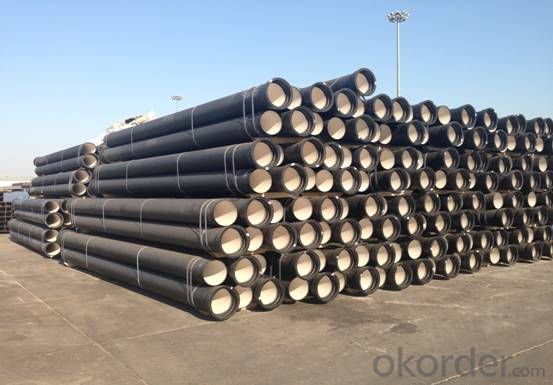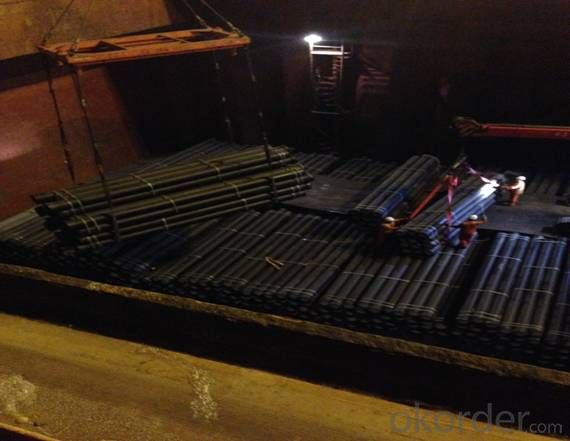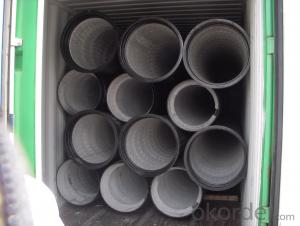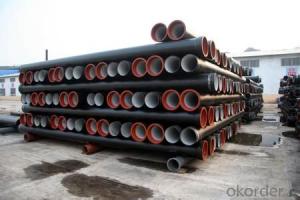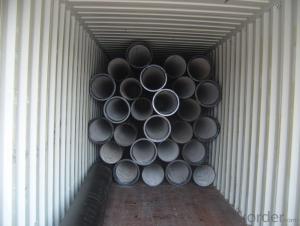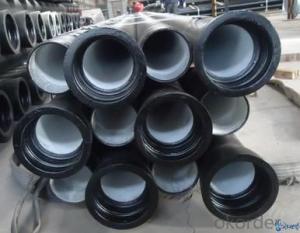DUCTILE IRON PIPE C Class DN150
- Loading Port:
- China Main Port
- Payment Terms:
- TT OR LC
- Min Order Qty:
- -
- Supply Capability:
- -
OKorder Service Pledge
OKorder Financial Service
You Might Also Like
Ductile Iron Cast Pipe is without any defects compare with tradition casting tech, which has many advantages particularly as follow:
(1) High density. In the "vertical upward casting" process, the melt iron of centre liquid column in center crystallizer is continuously feeding for volume shrinkage caused by condensation tube at outer circumference , which lead to be free of shrinkage porosity.
(2) High purity. When melt iron pouring, the mixed impurities such as gas, dross, sand grain which are lighter than melt iron could be eliminated at furnace mouth, its impossible to enter into the crystallizer through the channel, so the melt iron into the crystallizer is very pure.
(3) Strength with toughness. The cooling speed provided by continuous crystallizer is 30 times than sand casting and 5 times than centrifugal casting, and doesn't produce white iron, the eutectic cell volume of continuous cast iron is one eighth to one tenth compare with traditional cast iron. The density of graphite nodule in ductile iron can reach 300-700 pcs/mm2. Therefore, all reason above improve the strength and toughness of continuous cast iron.
(4) Free machining. The high speed cooling make the hardening phase (such as boride, steadite) not appear like reticular, massive or thick, but diffuse like fish bone and pane in shape, moreover, there are tiny graphite flakes inlaid hardening phase. It's free machining in BrinellHardness the range of 250-300HB. However, the Brinell Hardness of 250 is top limit to common metal materials.
(5) Uniform composition of tube wall. The convection mixing of liquid column caused by marching type drawing in crystallizer make the composition of tube wall well-distributed, and concentration gradient very little.
(6) High productivity. To the wall thickness of tube under 10mm, the speed of continuous casting is 1 meter/min, to the wall thickness of tube under 20mm, the speed of continuous casting is 0.5 meter/min, which is high efficiency that centrifugal or other casting tech couldn't reach.
- Q: What is the maximum allowable joint deflection for ductile iron pipes?
- Industry standards and guidelines typically specify the maximum allowable joint deflection for ductile iron pipes. These standards can vary depending on the specific application and local regulations. Typically, the maximum allowable joint deflection for ductile iron pipes is limited to a range of 1% to 5% of the pipe diameter. This means that the pipe can tolerate a deflection of up to 1% to 5% of its diameter without causing significant damage or compromising its structural integrity. However, it is important to consider factors such as pipe size, wall thickness, and operating conditions as these can affect the exact maximum allowable joint deflection. For specific guidelines on the maximum allowable joint deflection for ductile iron pipes in a given application, it is recommended to consult relevant industry standards like those published by the American Water Works Association (AWWA) or the International Organization for Standardization (ISO).
- Q: How are ductile iron pipes protected against external corrosion?
- Ductile iron pipes are protected against external corrosion through a combination of manufacturing processes and external coatings. The first line of defense is the inherent corrosion resistance of ductile iron itself. The iron is treated with a special alloying element, typically magnesium, which forms a protective layer on the surface of the pipe. This layer acts as a barrier against corrosion and helps to extend the lifespan of the pipe. In addition to the corrosion-resistant properties of the iron, ductile iron pipes are also externally coated with protective materials. One common method is to apply a layer of asphaltic or bituminous coating to the pipe's surface. This coating acts as a barrier against moisture and corrosive substances in the soil, preventing them from coming into contact with the iron. It also provides a layer of insulation, reducing the likelihood of galvanic corrosion. Another method of external corrosion protection is the use of fusion-bonded epoxy (FBE) coatings. FBE is a thermosetting resin that is applied to the surface of the pipe and then heat-cured to form a strong and durable coating. This coating provides excellent resistance against corrosion, abrasion, and impact, making it a popular choice for ductile iron pipes in harsh environments. In some cases, additional protective measures such as cathodic protection systems may be employed. These systems use electric currents to counteract the corrosion process by supplying electrons to the pipe's surface. This helps to prevent corrosion from occurring, especially in areas where the coating may have been damaged or compromised. Regular maintenance and inspection are also crucial in ensuring the long-term protection of ductile iron pipes against external corrosion. This includes periodic cleaning, repair of any coating damages, and monitoring the integrity of the protective layers. Overall, the combination of the inherent corrosion resistance of ductile iron, external coatings, and maintenance practices ensures that ductile iron pipes are well-protected against external corrosion, allowing them to have a longer lifespan and deliver reliable performance in various applications.
- Q: How do ductile iron pipes handle extreme temperatures?
- Ductile iron pipes are highly resistant to extreme temperatures. They can handle both high and low temperatures without any significant impact on their performance. This is due to the unique properties of ductile iron, including its high thermal conductivity and low thermal expansion coefficient. These characteristics allow the pipes to remain stable and durable, making them suitable for a wide range of temperature conditions.
- Q: What are the disadvantages of using ductile iron pipe?
- There are several disadvantages associated with using ductile iron pipe. Firstly, one major drawback is its cost. Ductile iron pipe tends to be more expensive than other types of piping materials such as PVC or even traditional cast iron. This can make it less appealing for projects with strict budget constraints. Secondly, ductile iron pipe is relatively heavy compared to other materials. This makes it more difficult to handle and install, requiring specialized equipment and additional labor. The weight can also make it more susceptible to damage during transport and installation. Another disadvantage is its susceptibility to corrosion. While ductile iron is more resistant to corrosion than traditional cast iron, it is still prone to rust and deterioration over time. This can lead to reduced lifespan and potential leaks or pipe failures. Additionally, ductile iron pipe has limited flexibility and is not as resistant to ground movement or settlement. This can result in cracking or breaking of the pipe, especially in areas with unstable soil conditions or seismic activity. Lastly, ductile iron pipe can have a rough interior surface, which can lead to increased friction and reduced flow capacity. This can result in higher pumping costs and decreased efficiency in fluid transportation. Overall, while ductile iron pipe has its advantages, such as its strength and durability, these disadvantages should be carefully considered when choosing the appropriate piping material for a specific project.
- Q: How do ductile iron pipes perform in high-altitude areas?
- Ductile iron pipes perform well in high-altitude areas due to their inherent strength and durability. The properties of ductile iron, including its high tensile strength and impact resistance, make it suitable for withstanding the challenges posed by high-altitude environments. One of the key advantages of ductile iron pipes is their ability to resist internal and external pressures. In high-altitude areas, where water pressure may vary significantly, ductile iron pipes can withstand the changes without compromising their structural integrity. This ensures the reliable and continuous flow of water without the risk of pipe failures or leaks. Ductile iron pipes also exhibit excellent resistance to corrosion, which is crucial in high-altitude areas where the atmospheric conditions can be more harsh and unpredictable. The pipes' protective lining and external coatings provide an additional layer of defense against corrosion, ensuring their longevity and reducing the need for frequent maintenance or replacements. Moreover, ductile iron pipes have a higher tolerance to temperature variations compared to other materials. In high-altitude areas, where temperature fluctuations can be extreme, these pipes can withstand the expansion and contraction without cracking or rupturing. This thermal stability is essential for maintaining the structural integrity of the pipeline system and preventing costly repairs. In summary, ductile iron pipes are well-suited for high-altitude areas due to their strength, durability, resistance to pressure variations, corrosion resistance, and thermal stability. These properties make them a reliable choice for water distribution systems in such environments, ensuring the continuous supply of water without compromising safety or efficiency.
- Q: How does ductile iron pipe perform in high-velocity flow conditions?
- Ductile iron pipe performs exceptionally well in high-velocity flow conditions. Due to its unique properties, including high tensile strength and impact resistance, ductile iron pipe can withstand the forces exerted by high-velocity flows without experiencing significant damage or failure. One of the key advantages of ductile iron pipe is its ability to resist the effects of water hammer, which is a sudden increase in pressure caused by the rapid deceleration or change in direction of water flow. This is particularly important in high-velocity flow conditions where the velocity of water is significantly higher than normal. Ductile iron pipes are designed to absorb and dissipate the energy generated by water hammer, preventing potential damage to the pipe and the surrounding infrastructure. Additionally, ductile iron pipe has excellent flow characteristics, allowing for smooth and efficient water transport even at high velocities. This is crucial in applications where a large volume of water needs to be transported quickly, such as in industrial processes or fire protection systems. The smooth interior surface of ductile iron pipe minimizes friction and pressure losses, ensuring that the water can flow freely and efficiently, reducing energy consumption and operating costs. Moreover, ductile iron pipe is highly resistant to corrosion, which is a common issue in high-velocity flow conditions where the water may contain aggressive chemicals or particulates. The protective lining and coating systems used in ductile iron pipes provide a barrier against corrosion, extending the lifespan of the pipe and maintaining its structural integrity. In summary, ductile iron pipe is well-suited for high-velocity flow conditions due to its ability to withstand water hammer, its excellent flow characteristics, and its resistance to corrosion. Its strength, durability, and reliable performance make it a preferred choice for various applications, ensuring efficient water transport even in demanding environments.
- Q: Are ductile iron pipes suitable for use in hydropower projects?
- Yes, ductile iron pipes are suitable for use in hydropower projects. Ductile iron pipes have a high tensile strength and are resistant to corrosion, making them ideal for applications in hydropower projects where water flow and pressure are involved. They are capable of withstanding high pressure and are durable, ensuring long-term reliability and safety in hydropower systems. Additionally, ductile iron pipes are cost-effective compared to other materials like steel, making them a popular choice for hydropower projects. Overall, ductile iron pipes offer the necessary characteristics and performance qualities required for the demanding conditions of hydropower projects.
- Q: Why does the construction wastewater system use ductile iron pipes instead of galvanized steel tubes?
- Then answer your question: first, the strength of ductile iron is much higher than that of ordinary low carbon steel, such as Q235. Corrosion resistance is much higher than that of ordinary steel pipe and the cost is lower than that of ordinary steel pipe. Second, large diameter steel pipe can only be made of spiral welded pipe, seamless steel pipe is particularly expensive, will not be used. The welded pipe is welded, easy to corrosion water leakage. Third, galvanizing is also a life and very expensive, the pipe has a fluid will wear on the inner wall, zinc plating is meaningless. Galvanized pipe is generally used as a water supply pipe, large caliber water pipes, such as more than 250, and now do not use steel pipes, mostly plastic pipes
- Q: Ductile iron gears are generally treated without heat treatment
- Heat treatment must be necessary, generally annealed first to machine, after quenching or nitriding treatment
- Q: How do ductile iron pipes handle differential settlement?
- Ductile iron pipes have the ability to handle differential settlement due to their inherent flexibility and strength. The material's ductility allows the pipes to withstand minor ground movements and settlement without causing significant damage or failure. The pipes can flex and adjust to the changing ground conditions, reducing the risk of cracks or breaks. Additionally, the inherent strength of ductile iron pipes helps distribute the load evenly, minimizing the impact of settlement on the overall integrity of the pipeline system.
Send your message to us
DUCTILE IRON PIPE C Class DN150
- Loading Port:
- China Main Port
- Payment Terms:
- TT OR LC
- Min Order Qty:
- -
- Supply Capability:
- -
OKorder Service Pledge
OKorder Financial Service
Similar products
Hot products
Hot Searches
Related keywords
